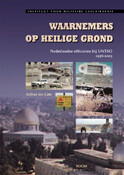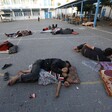The Electronic Intifada 12 November 2003

Arthur ten Cate, a researcher affiliated with the Dutch Institute for Military History in The Hague, recently published a book “Waarnemers op heilige grond” [lit. “Observers on holy ground”], Dutch officers with UNTSO 1956-2003, in which he named two Israeli crimps and Dutch officers who were involved in intelligence gathering for Israel.
Outside the public eye, the Netherlands contribute army officers from the ground, air and naval forces to the United Nations Truce Supervision Organization in the Middle East. UNTSO was established in 1948. The Security Council, in resolution 50 (1948), called for a cessation of hostilities in Palestine and decided that the truce should be supervised by the UN Mediator, with the assistance of a group of military observers, which has become known as UNTSO. In 1949, UNTSO military observers remained to supervise the Armistice Agreements between Israel and its Arab neighbours, which were for many years the main basis of the uneasy truce in the whole area. UNTSO’s activities have been and still are spread over territory within five States, and therefore it has relations with five host countries — Egypt, Israel, Jordan, Lebanon and Syrian Arab Republic.
In the Middle East, groups of UNTSO military observers are today attached to the peacekeeping forces in the area: the United Nations Disengagement Observer Force (UNDOF) in the Golan Heights and the United Nations Interim Force in Lebanon (UNIFIL). A group of observers remains in Sinai to maintain a United Nations presence in that peninsula. In addition, UNTSO maintains offices in Beirut and Damascus.
During their missions, Dutch officers were eyewitnesses of the Israeli-Arab conflict. They were in the region during the Suez crisis, at the frontlines of the 1967 June War, the 1973 October War and were present during the Israeli invasion of Lebanon and the Gulf War.
Ten Cate’s book describes the various wars and the conflict in the Middle East from the perspective of these Dutch officers. He describes what they observed and what they reported to the Security Council in New York and how they contributed to the attempts by the international community to contain this conflict.
Between 1956 and today, around 500 officers of the Dutch airforce, ground forces and navy operated in UNTSO. He described how a one-sided, pro-Israeli group of officers shifted to a more neutral position. When they returned back to the Netherlands, people did not believe their stories. Often they were branded as “anti-Israeli” or even “anti-semitic”. Eventhough a number of Dutch officers were actively involved in espionage for Israel, the majority of Dutch officers with UNTSO changed their opinion based on what they observed themselves. Ten Cate concludes his book saying that “much earlier than the rest of the Dutch people, the Dutch officers learned that the Israeli-Arab conflict has two sides instead of one.”
One of the Dutch UN officers named in Ten Cate’s book is major G.J. Schüssler, commander of the headquarters of UNTSO in Tiberias. He was approached by the Israeli veterinary surgeon Uzi Ghanoch, who had studied in Utrecht in the Netherlands. He spoke fluent Dutch and he asked Schüssler whether he was willing to work for Israeli intelligence. The Dutch major agreed on condition that he would not receive “any reward”. Schüssler provided Israel with intelligence on locations of anti-aircraft artillery in Syria and on Palestinian fedayeen in Jordan. Ten Cate wrote that every Dutch officer working in Tiberias was approached by Ghanoch.
Major Ijsbrand Smit, who was with the Dutch airforce, also provided intelligence to Israel. He was married with an agent of the Israeli intelligence service, Mossad. Smit was actively engaged in the recruitment of new spies. Later, when he worked at the NATO headquarters in Bergen and at the Foreign Intelligence Service in The Hague, he continued working for Israel. In 1983 he was exposed. Behind closed doors he appeared before the council of war. The court accepted his defense saying that the co-operation between Israeli and Dutch intelligence was strong and that information would anyway be shared between the two agencies. He was finally released due to “lack of evidence”.
The Mossad had special interest to recruit UN officers, who observed the truce between Israel and its neighbours. Ten Cate described how married soldiers would be approached by attractive women. They could choose to co-operate or explain to their wives what had happened.
When they just started their mission with UNTSO, most Dutch officers were pro-Israel, writes Ten Cate. For some this attitude and position changed over time. The first commander of UNTSO, the Swedish major-general Carl von Horn wrote in his memoires that as well as the Jordanian intelligence as the Israeli intelligence were keeping control over the observers, however, he was most concerned with the approach of the Israeli intelligence.
They tapped communications, but also bribed UN personnel or blackmailed them. Von Horn tried to clean his organisation and established a counter-espionage service.
The Dutch officers felt isolated, writes Ten Cate. Back home, nobody wanted to hear cases of violations of the ceasefire. The Dutch public only wanted to hear heroic stories of the “brave Jewish pioneers”. Interviewed by an army newspaper, Captain J.C. Mühren, mentioned two examples of Israeli provoked violations of the truce. He told about his visit to a Jordanian village, where in November 1966, Israeli forces blew up homes and killed a number of civilians and Jordanian soldiers. The publication was prohibited by the Dutch Ministry of Defense. He was told that “the higher echelons felt that the article did not match with the feelings of the Dutch people about Israel.”
The exact number of Dutch UNTSO observers spying for Israel is not known. Ten Cate wrote that every observer often knew a fellow countryman who “did something for Israel.” According to him, this was mostly related to the sympathy felt for Israel. Ten Cate described one case in which personal property was stolen from Dutch officers. After the 1967 War, in which Israel occupied the West Bank, the Gaza Strip, the Sinai and the Golan Heights, the UNTSO headquarters in East Jerusalem was looted by Israeli soldiers. Boxes with personal properties of the Dutch officers disappeared. Also appartments from which a number of UN observers were evacuated were looted.
Related Links:




